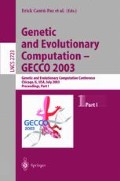Abstract
This paper explores how inductive machine learning can guide the breeding process of evolutionary algorithms for black-box function optimization. In particular, decision trees are used to identify the underlying characteristics of good and bad individuals, using the mined knowledge for wise breeding purposes. Inductive learning is complemented with statistical learning in order to define the breeding process. The proposed evolutionary process optimizes the fitness function in a dual manner, both maximizing and minimizing it. The paper also summarize some tuning and population sizing issues, as well as some preliminary results obtained using the proposed algorithm.
Access this chapter
Tax calculation will be finalised at checkout
Purchases are for personal use only
Preview
Unable to display preview. Download preview PDF.
References
Baluja, S.: Population-based incremental learning: A method for integrating genetic search function optimization and competitive learning. Technical Report CMU-CS-94-163, Carnegie Mellon University (1994)
Baluja, S.: An empirical comparation of seven iterative and evolutionary function optimization heuristics. Technical Report CMU-CS-95-193, Carnegie Mellon University (1995)
Juels, A., Wattenberg, M.: Stochastic hillclimbing as a baseline method for evaluating genetic algorithms. Technical Report CSD-94-834, Computers Science Department, University of California at Berkeley, USA (1995)
Mühlenbein, H., Paaß, G.: From recombination of genes to estimation of distributions I. In: Lecture Notes in Computer Science 1411: Parallel Problem Solving from Nature-PPSN IV, Springer (1996) 178–187
Larrañaga, P., Lozano, J.: Estimation of Distribution Algorithms. GENA 2. Kluwer Academic Publishers (2002)
Mühlenbein, H.: The equation for response to selection and its use for prediction. Evolutionary Computation 5 (1998) 303–346
Harik, G., Lobo, F., Goldberg, D.: The compact genetic algorithm. In: Proceedings of the IEEE Conferrence on Evolutionary Computation, IEEE press (1998) 523–528
Pelikan, M.: Bayesian Optimization Algorithm: from single level to hierarchy. PhD thesis, University of Illinois at Urbana Champaign, Urbana, Illinois, USA (June, 2002)
Pelikan, M., Goldberg, D., Cantú-Paz, E.: BOA: the Bayesian Optimization Algorithm. In: Proceedings of the Genetic and Evolutionary Computation Conference (GECCO-99), Morgan Kaufmann (1999) 525–532
Michalski, R.: Learnable Evolution: Combining Symbolic and Evolutionary Learning. In: Proceedings of the 4th International Workshop on Multistrategy Learning, Decenzano del Garda, Italy. (June 11–14, 1998)
Michalski, R.: Learnable Evolution Model: Evolutionary Processes Guided by Machine Learning. Machine Learning 38 (2000) 9–40
Wnek, J., Kaufman, K., Bloedorn, E., Michalski, R.: Inductive Learning System AQ15c: The Method and User’s Guide. Reports of the Machine Learning and Inference Laboratory, MLI 95-4, George Manson University, Fairfax, VA (March, 1995)
Kaufman, K., Michalski, R.: The AQ18 Machine Learning and Data Mining System: An Implementation and User’s Guide. Reports of the Machine Learning and Inference Laboratory, George Manson University, Fairfax, VA (1999)
Quinlan, J.R.: Induction of decision trees. Machine Learning 1 (1986) 81–106
Quinlan, J.R.: C4.5: programs for machine learning. Morgan Kaufmann (1993)
Baluja, S., Caruana, R.: Removing the genetics from standard genetic algorithms. In: International Conference on Machine Learning, Morgan Kaufmann (1995) 38–46
Mitchell, T.M.: Machine Learning. McGraw Hill (1997)
Goldberg, D.E.: The Design of Innovation: Lessons from and for Competent Genetic Algorithms. Kluwer Academic Publishers (2002)
Holland, J.H.: Adaptation in Natural and Artificial Systems: An Introductory Analysis with Applications to Biology, Control and Artificial Intelligence. MIT Press/Bradford Books edition (1975)
Gonzalez, C., Lozano, J., Larranarraga, P.: Analyzing the pbil algorithm by means of discrete dynamical systems. Complex Systems 12 (2001) 465–479
Haussler, D.: Quantifying inductive bias: AI learning algorithms and Valiant’s learning framework. Artificial Intelligence 36 (1988) 177–221
Valiant, L.: A theory of the learnable. Communications of ACM 27 (1984) 1134–1142
Author information
Authors and Affiliations
Editor information
Editors and Affiliations
Rights and permissions
Copyright information
© 2003 Springer-Verlag Berlin Heidelberg
About this paper
Cite this paper
Llorà, X., Goldberg, D.E. (2003). Wise Breeding GA via Machine Learning Techniques for Function Optimization. In: Cantú-Paz, E., et al. Genetic and Evolutionary Computation — GECCO 2003. GECCO 2003. Lecture Notes in Computer Science, vol 2723. Springer, Berlin, Heidelberg. https://doi.org/10.1007/3-540-45105-6_125
Download citation
DOI: https://doi.org/10.1007/3-540-45105-6_125
Published:
Publisher Name: Springer, Berlin, Heidelberg
Print ISBN: 978-3-540-40602-0
Online ISBN: 978-3-540-45105-1
eBook Packages: Springer Book Archive

